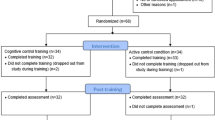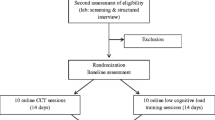Abstract
We attempted to replicate findings that depressed patients with high learned resourcefulness, as measured by the Self-Control Schedule (SCS), respond better to cognitive behavioral therapy (CBT) in a pooled sample of 112 depressed patients, including 53 patients participating in a controlled research investigation and 59 private practice patients participating in a naturalistic research study. As predicted, patients with high learned resourcefulness at intake improved the most during the first 12 weeks of treatment in the combined sample. However, the size of the effect was quite small and did not emerge when the two groups were analyzed separately. The relationship between learned resourcefulness and recovery was moderated by the severity of initial depression: SCS scores predicted improvement only among subjects who were more severely depressed at intake. These results may help to explain previous inconsistencies in reports regarding the ability of the SCS to predict the degree of response to CBT for depression.
Similar content being viewed by others
References
Baldessarini, R. J. (1983).Biomedical aspects of depression, Washington, DC. American Psychiatric Association Press.
Beck, A. T., Rush, A. J., Shaw, B. R., & Emery, G. (1979).Cognitive therapy of depression. New York: Guilford Press.
Beck, A. T., Ward, C. H., Mendelson, M., Mock, J., & Erbaugh, T. (1961). An inventory for measuring depression.Archives of General Psychiatry, 4, 561–571.
Blackburn, I. M., Bishop, S., Glenn, M. E., Whalley, L. J., & Christie, J. E. (1981). The efficacy of cognitive therapy in depression—A treatment trial using cognitive therapy and pharmacotherapy, each alone and in combination.British Journal of Psychiatry, 139, 181–189.
Burns, D. D. (1980).Feeling good: the new mood therapy. New York: William Morrow & Co.
Burns, D. D. (1989).The feeling good handbook. New York: William Morrow & Co.
Burns, D. D. (1990). Perfectionistic thinking and affective disorders. Unpublished manuscript.
Burns, D. D., & Nolen-Hoeksema, S. (1991). Coping styles, homework compliance and the effectiveness of cognitive behavioral therapy.Journal of Consulting and Clinical Psychology, 59, 305–311.
Burns, D. D., & Nolen-Hoeksema, S. (1992). Therapeutic empathy and recovery from depression in cognitive-behavioral therapy: A structural equation model.Journal of Consulting and Clinical Psychology, 60, 441–449.
Burns, D. D., Sayers, S., & Moras, K. (in press). Intimate relationships and depression: Is there a causal relationship? In press,Journal of Consulting and Clinical Psychology.
Cohen, J., & Cohen P. (1983).Applied multiple regression/correlation analysis for the behavioral sciences (2nd ed.), Hillsdale, NJ: Erlbaum.
Dobson, K. S. (1989) A meta-analyses of the efficacy of cognitive therapy for depression.Journal of Consulting and Clinical Psychology, 57(3), 414–419.
Elkin, I., Shea, T., Watkins, J. T., Imber, S. D., Sotsky, S. M., Collins, J. F., Glass, D. R., Pilkonis, P. A., Leber, W. R., Docherty, J. P., Fiester, S. J., & Perloff, M. B. (1989). National Institute of Mental Health treatment of depression collaborative research program: General effectiveness of treatments.Archives of General Psychiatry, 46, 971–982.
Endicott, J., & Spitzer, R. L. (1978). A diagnostic interview: the schedule for affective disorders and schizophrenia.Archives of General Psychiatry, 35, 837–848.
Hamilton, M. (1960). A rating scale for depression.Journal of Neurology, Neurosurgery, and Psychiatry, 23, 56–62.
Hanushek, E. A., & Jackson, J. E. (1977).Statistical methods for social scientists. Orlando, FL: Academic Press.
Hoberman, H. M., Lewinsohn, P. M., & Tilson, M. (1988). Group treatment of depression: Individual predictors of outcome.Journal of Consulting and Clinical Psychology, 56, 393–398.
Hollon, S., & Beck, A. T. (1986). Research on cognitive therapies. In S. Garfield and A. E. Bergin (Eds.),Handbook of psychotherapy and behavior change (pp. 43–482). New York: John Wiley & Sons.
Jarrett, R. B., Eaves, G. G., Grannemann, B. D., & Rush, A. J. (1991). Clinical, cognitive, and demographic predictors or response to cognitive therapy for depression: A preliminary report.Psychiatry Research, 37, 245–260.
Jarrett, R. B., Giles, D. E., Gullion, C. M., & Rush, A. J. (1991). Does learned resourcefulness predict response to cognitive therapy in depressed outpatients?Journal of Affective Disorders, 23, 223–229.
Kavanagh, D. J. & Wilson, P. H. (1989). Prediction of outcome with group cognitive therapy for depression.Behavior Research and Therapy, 27(4), 333–343.
Keller, K. E. (1983). Dysfunctional attitudes and cognitive therapy for depression.Cognitive Therapy and Research, 7, 437–444.
Persons, J. B., & Burns, D. D. (1985). Mechanisms of action of cognitive therapy: Relative contributions of technical and interpersonal intervention.Cognitive Therapy and Research, 9(5), 539–551.
Persons, J. B., Burns, D. D., & Perloff, J. M. (1988). Predictors of dropout and outcome in cognitive therapy for depression in a private practice setting.Cognitive Therapy and Research, 12(6), 557–575.
Rehm, L. P., Kaslow, N. J., & Rabin, A. S. (1987) Cognitive and behavioral targets in a self-control therapy program for depression.Journal of Consulting and Clinical Psychology, 55, 60–67.
Robinson, L. A., Berman, J. S., & Neimeyer, R. A. (1990). Psychotherapy for the treatment of depression: A comprehensive review of controlled outcome research.Psychological Bulletin, 108(1), 80–49.
Rosenbaum, M. (1980). A schedule for assessing self-control behaviors: Preliminary findings.Behavior Therapy, 11, 109–121.
Rosenbaum, M. (1983). Learned resourcefulness as a behavioral repertoire for the self regulation of internal events: Issues and speculations. In M. Rosenbaum, C. M. Frank, & Y. Jaffe (Eds.),Perspectives on behavior therapy in the eighties. New York: Springer.
Rosenbaum, M., & Jaffe Y. (1983). Learned helplessness: The role of individual differences in learned resourcefulness.British Journal of Social Psychology, 22, 215–225.
Rude, S. S. (1986). Relative benefits of assertion or cognitive self-control treatment for depression as a function of proficiency in each domain.Journal of Consulting and Clinical Psychology, 54, 390–394.
Rude, S. S., & Rehm, L. P. (1991). Response to treatments for depression: The role of initial status on targeted cognitive and behavioral skills.Clinical Psychology Review, 11, 493–514.
Shaw, B. F. (1984). Specification of the training and evaluation of cognitive therapists for outcome studies. In Williams, J. B. W. & Spitzer, R. L., (Eds.),Psychotherapy research: where are we and where should we go? New York: Guilford Press.
Simons, A. D., Lustman, P. J., Wetzel, R. D., & Murphy, G. E. (1985). Predicting response to cognitive therapy of depression: The role of learned resourcefulness.Cognitive Therapy and Research, 9(1), 79–89.
Sotsky, S. M., Glass, D. R., Shea, M. T., Pilkonis, P. A., Collins, J. F., Elkin, I., Watkins, J. T., Imber, S. D., Leber, W. R., Moyer, J., & Oliveri, M. E. (1991). Patient predictors of response to psychotherapy and pharmacotherapy: Findings in the NIMH treatment of depression collaborative research program.Archives of General Psychiatry, 148(8), 997–1008.
Spitzer, R. L., Endicott, J., & Robins, E. (1978). Research diagnostic criteria: Rationale and reliability.Archives of General Psychiatry, 35, 773–782.
Spitzer, R. L., Williams, J. B. (1983).Structured Clinical Interview for DSM — III. Biometrics Research Department, New York State Psychiatric Institute, New York.
Spitzer, R. L., Williams, J. B. W., & Gibbon, M. (1985).Structured Clinical Interview for DSM-III-R (SCID). Biometric Research Department, New York State Psychiatric Institute, New York.
Thase, M. E., Simons, A. D., Cahalane, J., McGeary, J., & Harden, T. (1991). Seventy or depression and response to cognitive behavior therapy.American Journal of Psychiatry, 148(6), 784–789.
Weissman, A. M. (1979). The Dysfunctional Attitude Scale: a validation study (Doctoral dissertation, University of Pennsylvania).Dissertation Abstracts Int., 40, 1389B-1390B.
Author information
Authors and Affiliations
Rights and permissions
About this article
Cite this article
Burns, D.D., Rude, S., Simons, A.D. et al. Does learned resourcefulness predict the response to cognitive behavioral therapy for depression?. Cogn Ther Res 18, 277–291 (1994). https://doi.org/10.1007/BF02357780
Issue Date:
DOI: https://doi.org/10.1007/BF02357780




